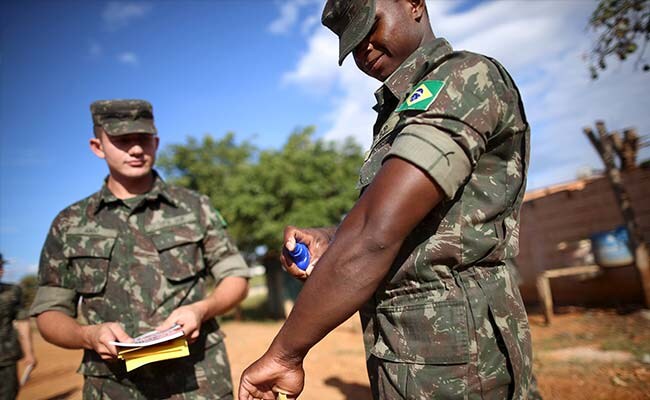
More than 70,000 troops have been deployed in Rio de Janeiro, a priority because of the Olympics games. (Reuters photo)
Brasilia:
Brazil's government launched a nationwide campaign on Saturday to fight the Zika virus, with President Dilma Rousseff and cabinet ministers personally visiting homes and handing out leaflets along with 220,000 troops.
Under a scorching sun in the neighborhood of Zepellin in the outskirts of Rio de Janeiro, which will host the Olympic Games in August, Rousseff said everyone needed to take part in the battle against the mosquito carrying Zika, suspected of causing the birth defect microcephaly.
There are currently no vaccines or treatment for the virus, though research institutes and pharmaceutical companies are working on several possibilities.
"Brazil and the world have lost the battle against dengue, but we won the war against yellow fever, which is carried by the same mosquito. We will win the war against Zika," Rousseff said as she launched the campaign, which also targets other mosquito-borne diseases.
Twenty-seven cabinet ministers including central bank chief Alexandre Tombini participated in the operation aimed at visiting three million homes across 356 towns and cities on Saturday.
Soldiers in Sao Paulo handed out fliers with the slogan "A mosquito isn't stronger than a whole country" at entrances to the popular Ibirapuera park. Troops also visited homes in downtown Brasilia.
The so-called National Day for "Zero Zika" is focused on raising awareness about the disease, Rousseff said. Other operations specifically aimed at spreading larvicides and eliminating breeding spots will be launched later this month.
More than 70,000 troops were deployed in Rio de Janeiro, a priority because of the Olympics, Rousseff said, adding that sports authorities have said the Zika outbreak did not jeopardize the event.
Much remains unknown about Zika, including whether the virus actually causes microcephaly.
Brazil is investigating the potential link between Zika infections and more than 4,300 suspected cases of microcephaly, a condition marked by abnormally small head size that can result in developmental problems.
Researchers have confirmed more than 460 of these cases as microcephaly and identified evidence of Zika infection in 41 of these cases, but have not proven that Zika can cause microcephaly.
The Zika outbreak is affecting large parts of Latin America and the Caribbean and is likely to spread to all countries in the Americas except for Canada and Chile, the World Health Organization has said.
(This story has not been edited by NDTV staff and is auto-generated from a syndicated feed.)
Under a scorching sun in the neighborhood of Zepellin in the outskirts of Rio de Janeiro, which will host the Olympic Games in August, Rousseff said everyone needed to take part in the battle against the mosquito carrying Zika, suspected of causing the birth defect microcephaly.
There are currently no vaccines or treatment for the virus, though research institutes and pharmaceutical companies are working on several possibilities.
"Brazil and the world have lost the battle against dengue, but we won the war against yellow fever, which is carried by the same mosquito. We will win the war against Zika," Rousseff said as she launched the campaign, which also targets other mosquito-borne diseases.
Twenty-seven cabinet ministers including central bank chief Alexandre Tombini participated in the operation aimed at visiting three million homes across 356 towns and cities on Saturday.
Soldiers in Sao Paulo handed out fliers with the slogan "A mosquito isn't stronger than a whole country" at entrances to the popular Ibirapuera park. Troops also visited homes in downtown Brasilia.
The so-called National Day for "Zero Zika" is focused on raising awareness about the disease, Rousseff said. Other operations specifically aimed at spreading larvicides and eliminating breeding spots will be launched later this month.
More than 70,000 troops were deployed in Rio de Janeiro, a priority because of the Olympics, Rousseff said, adding that sports authorities have said the Zika outbreak did not jeopardize the event.
Much remains unknown about Zika, including whether the virus actually causes microcephaly.
Brazil is investigating the potential link between Zika infections and more than 4,300 suspected cases of microcephaly, a condition marked by abnormally small head size that can result in developmental problems.
Researchers have confirmed more than 460 of these cases as microcephaly and identified evidence of Zika infection in 41 of these cases, but have not proven that Zika can cause microcephaly.
The Zika outbreak is affecting large parts of Latin America and the Caribbean and is likely to spread to all countries in the Americas except for Canada and Chile, the World Health Organization has said.
© Thomson Reuters 2016
(This story has not been edited by NDTV staff and is auto-generated from a syndicated feed.)
Track Latest News Live on NDTV.com and get news updates from India and around the world

